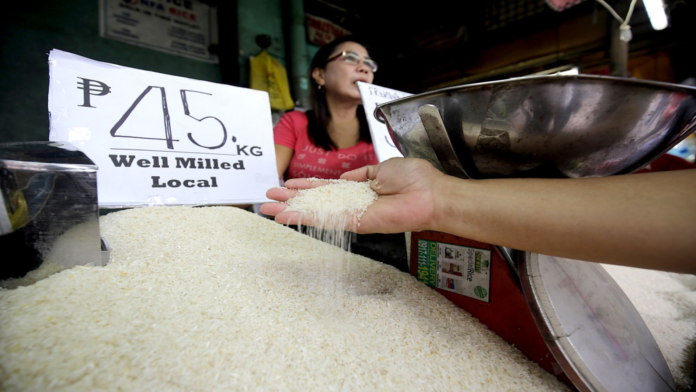President Ferdinand R. Marcos Jr. said the government will maximize the use of new technology to ensure a stable supply of rice in the Philippines.
In his speech during the launch of the 2023 Mariano Marcos State University (MMSU)-Philippine Rice Research Institute (PhilRice) rice paddy art on Monday, Marcos underscored the importance of taking “new technology from the laboratory to the rice field.”
“There’s a necessary work to be done for us to be able to, I say, take the new technology from the laboratory to the rice field. And that is where we now come in,” he said.
“‘Yan ang gagawin ngayon ng DA na kukunin ang pinakamagagandang teknolohiya lalo ngayon technologies become so important – the new technologies have become so important because of climate change. (That’s what the DA will do now to get the best technology especially today technologies become so important because of climate change),” he added.
Marcos is also the concurrent secretary of the Department of Agriculture.
Marcos said the government will develop the technologies necessary for the country’s agricultural productivity, adding that “it is the government’s job to bring now those new products to the market.”
The President also cited the need to increase rice production.
“We have had to control the prices of rice because the markets are very volatile, so we are trying to stabilize it here in the Philippines … kailangan taasan natin ang production natin (we need to increase production),” Marcos said.
“So it’s correct that we have to increase our production. But we have to make sure that an increase in production redounds to the benefit of the farmer. Because it is equally important for me that the farmer makes a good living,” he added.
The President graced the launch of the MMSU-PhilRice’s Rice Paddy Art, featuring his facial image and his “Bagong Pilipinas” governance tagline at the sidelines of the commemoration of the 106th birth anniversary of his father, the late president Ferdinand E. Marcos Sr. in Batac City, Ilocos Norte.
The rice paddy art of the MMSU-PhilRice aims to pay tribute to individuals who have made significant contributions to agricultural development and nation-building while showcasing innovative rice production technologies and promoting agri-tourism in Ilocos Norte.
Marcos cited the successful collaboration of the MMSU and PhilRice, resulting in rice production systems and technologies that can be pursued in the coming years.
Meanwhile, the MMSU vowed to reinvigorate the agriculture sector by using innovative solutions in support of the Marcos administration’s food security and economic recovery program.
“The rice paddy art spells MMSU and PhilRice’s commitment to boost rice productivity, encourage the youth to take up agriculture as the beneficiary enterprise, and promote sustainable agri-eco tourism,” MMSU president Shirley Agrupis said.
Attended by over 5,000 students, farmers organizations, local government units and national government line agencies, the rice paddy art launch, among other collaborative programs and activities of the university with allies for development, is expected to inspire more people to renew and strengthen their commitment for a food-secure Philippines.
To date, MMSU along with a total of 88 farmer-cooperators continue to maintain a 23-hectare consolidated model rice farm, equipped with solar-powered pumps and irrigation canals. It also showcases modernized farming with its transplanter and harvesters donated by partner agencies.
Sherlyn Nicolas, chief for monitoring and evaluation, said the farmers generally harvested more than their produce before their involvement in the MMSU CARES Farm.
In the past rice cropping season, the farmer-cooperators gained an average of 3.55 tons per hectare despite the calamities during the season.
Charito Samsam, one of the farmer-cooperators of MMSU, said she gained the highest productivity with 1,683 kilograms in their 3,000 square meter area which translates to a potential harvest of 5.6 tons per hectare using NSIC Rc 160.
To further reduce production costs in rice farming, the MMSU is recommending several technology interventions such as the use of drought-resistant rice or early maturing and flood-tolerant varieties; Bio-N as inoculant; carrageenan plant growth promoter; and organic fertilizer.
Seed stocks and fertilizers are also distributed to farmer-cooperators right after the pre-dispersal training.
Aside from rice, other high-value crops like corn, garlic, and tomato are also being piloted at the university model farms to boost farmers’ productivity. (PNA)


